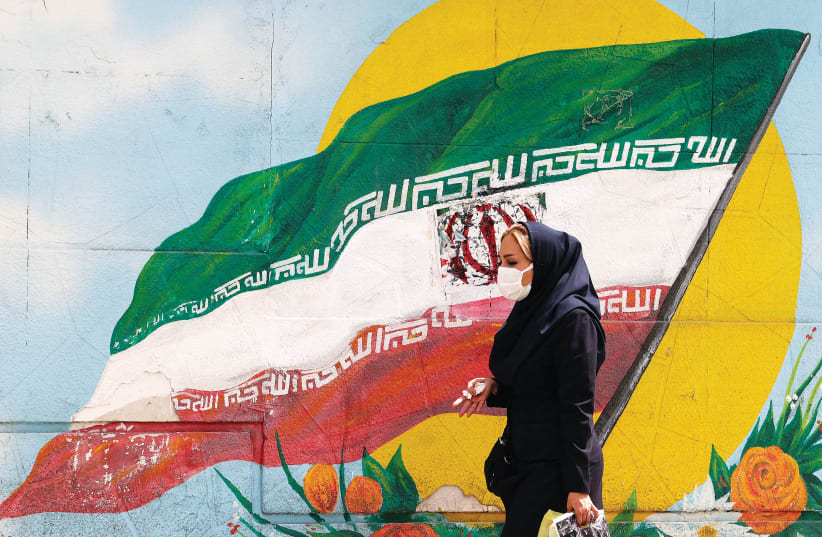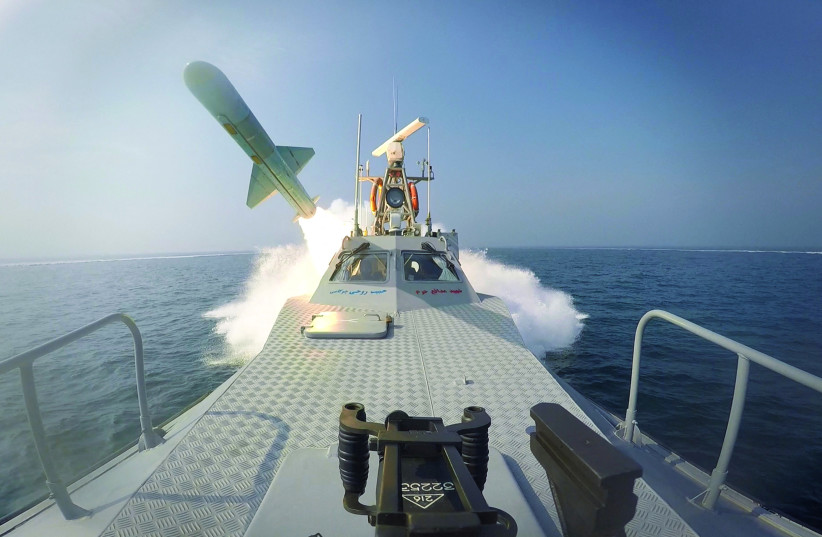Recent events in Syria, Lebanon, Gaza, Israel and the West Bank suggest that a concerted effort is underway by the Iran-led regional bloc to increase pressure on Israel. The evidence suggests that the possibility that this may result in war has been taken into account, and the Iranians and their allies have decided to move ahead nevertheless and take this risk.
The infiltration from south Lebanon by an operative carrying a Claymore mine on March 13, and the launching of 34 rockets from south Lebanon by Hamas on April 6 are the main indications that a concerted attempt is under way. These attacks have been accompanied by a series of ostentatious meetings between Hezbollah leaders in south Lebanon and delegations from both Hamas and Islamic Jihad, and by incendiary messages from the leaders of various components in this bloc.
“Zionists are fighting each other and are in a hurry to destroy themselves.”
Ebrahim Raisi
Statements by senior Iranian officials in recent days have, for example, enthusiastically predicted the imminent collapse of Israel. President Ebrahim Raisi, quoted by the Islamic Revolutionary Guard Corps-linked Tasnim channel on Wednesday, said that the “Zionists are fighting each other and are in a hurry to destroy themselves.” Iranian Army chief Maj.-Gen. Abdolrahim Mousavi said that “we are observing the confusion and disorientation of the hegemonic system, especially the clearer signals of collapse and breakdown of the Zionist regime.”
Rumblings in pro-Iran regional media, such as the Lebanese Al Akhbar newspaper, repeat the strategy according to which the unifying symbol of al-Aqsa Mosque is to be used to “unify the arenas” of Lebanon, Gaza, Jerusalem, the West Bank and pre-1967 Israel.”
Israel’s response, so far, has been hesitant and uncertain. A recent Israeli media report quoted an assessment given by the IDF to the cabinet according to which the Hezbollah leadership was not forewarned of the Hamas plan to launch rockets from south Lebanon, did not give the go ahead for it, and hence should not be held responsible for it.
The military is, of course, privy to sources of information vastly beyond those of this author. Nevertheless, some skepticism toward this assessment is unavoidable. Perhaps unusually among Israel-based correspondents, I have had the experience of traveling across Lebanon south of the Litani River in a non-military context. It is one of the most tightly secured areas on earth.Vehicles without license plates, often with blacked-out windows, are ubiquitous in every village and town. These and similarly unmarked motorcycles are visible evidence of Hezbollah's presence. Behind this representation, without doubt, is a yet wider circle of invisible surveillance.
The notion that Hamas or any other Palestinian organization could have brought into this area the necessary personnel and equipment required to launch 34 rockets at Israel without the knowledge of Hezbollah severely strains credulity.
Quite apart from the practical difficulties, it seems less than likely that at a time of visible rapprochement between the two organizations, Hamas would take upon itself of its own volition to embroil Hezbollah in its actions against Israel. Sunni Hamas and Shia Hezbollah backed different sides in the Syrian civil war.Hamas, with its roots in the Muslim Brotherhood, sought to align with what it thought was an emergent new bloc of conservative Islamic regimes. Hezbollah, of course, as a Shia franchise of the IRGC, stayed with its patron. But the Sunni Islamic bloc that Hamas sought to be part of never emerged. Hamas was forced to try to find its way back to the pro-Iran bloc. With the Arab Spring period now a fading memory, it has largely done so. It makes no sense that it would now jeopardize this process.
The inevitable conclusion is that this assessment is most likely inaccurate. As to whether it was given in order to support a policy preference according to which Israel would respond to the rocket fire in only a limited way, avoiding all damage to Hezbollah facilities, one can only speculate.
Strategic attacks on the Israeli homefront
THE APPARENTLY coordinated series of attacks which Israel is currently experiencing should be seen as emerging from a strategy and praxis of long standing held by Iran and its various franchises and clients. Veteran Israeli journalist and analyst Ehud Yaari, writing shortly after the Second Lebanon War of 2006, termed this outlook the “Muqawama [resistance] Doctrine.”This doctrine, according to Ya’ari, advocates an open-ended campaign of military pressure against Israel, conducted for the most part by non-state forces. The goal, as he expressed it, is the “methodical erosion of the enemy’s resolve.” The belief underlying this project is that Israel is an internally weak society, beset by contradictions. The intention therefore is to subject this fragile vessel to unrelenting pressure, in the belief that eventually it will begin to crack, and will eventually crumble.
The adherents to this doctrine evidently think that an important moment in this process has been reached, given the current internal crisis in Israel. They are therefore keen to increase the pressure, and are prepared to take significant risks and depart from previous patterns of operation.
The outlook described above is in many ways a descendant of earlier Arab and Palestinian nationalist perceptions of Israel, dating back to the first days of the conflict with Zionism. The current challenge differs from earlier manifestations, however, in that it is headed by a state (Iran) with a particular and sophisticated understanding of the melding of state power with irregular military activity, and the combining of conventional military, paramilitary and political forms of activity. Iran’s methods in this regard have delivered it significant achievements elsewhere in the region, in Syria, Yemen, Iraq and Lebanon.
The focus on this campaign goes back to the first days of the Islamist regime in Iran, and indeed precedes the 1979 Islamic Revolution, in the thinking of those who led it. Ayatollah Khomeini, writing in 1968, for example, asserted that “the danger is directed at the very essence of Islam, it is the duty of all Muslims, and specifically of Islamic states, to take the initiative for the obliteration of this pond of decay [Israel] with all possible means.”
“Zionists are fighting each other and are in a hurry to destroy themselves.”
Iranian President Ebrahim Raisi
Sheikh Naim Qassem, a veteran and very senior official of Lebanese Hezbollah, quoted from Surah al-Israa of the Koran in his history of his movement, to explain the nature of its campaign. The quote reads: “And we decreed for the Children of Israel in the scripture: Ye verily will work corruption in the earth twice, and ye will become great tyrants. So when the time for the first of the two came, We roused against you slaves of Ours of great might, who ravaged [your] country, and it was a threat performed... When the time for the second of the judgments came, We roused against you others of Our slaves to ravage you, and to enter the Temple even as they entered it the first time, and to lay waste all that they conquered with an utter wasting.”
The available evidence would suggest that the leaders of this bloc have discerned a moment of opportunity for the advancement of the project described above. Israeli planners may have concluded that the current divided Israeli house was in no shape for embarking on a determined response to the recent acts of aggression. If so, Israel’s leaders should be aware that given the nature of the thinking on the other side, the projection of weakness and hesitancy is likely to instill greater confidence, leading to further erosion of deterrence, and increasing the likelihood of additional and yet more reckless moves in the period ahead.

